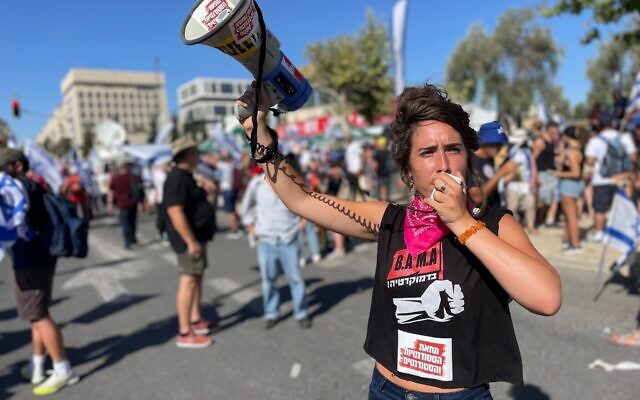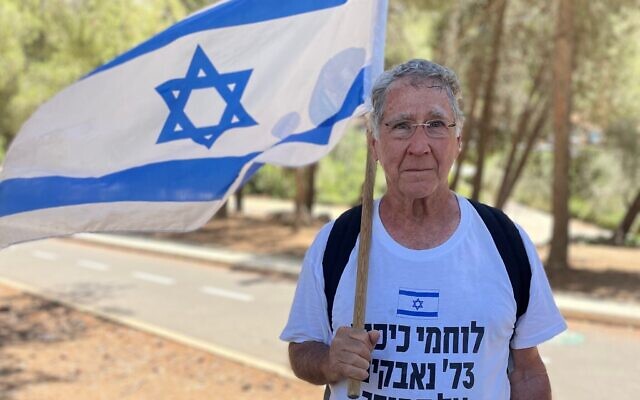Protesters vow to fight on against government’s judicial overhaul
Protesters decry coalition’s ‘regime change’ agenda and say they are preparing for the next round: ‘This is our country and we need to fight for it and protect it’

(Times of Israel) When the news was announced that the government’s law to limit judicial review of the “reasonableness” of politicians’ decisions had been passed into law in the Knesset, thousands upon thousands of protesters outside the Supreme Court burst into cries of “Shame” and “Democracy or rebellion.”
Horns were honked, railings were rattled, a sea of Israeli flags rippled in the afternoon breeze, and chants of “We are not afraid,” “Israel is not a dictatorship,” and the rhythmic chant of “Democracy” rang out across from the seat of the country’s top court.
Defiant calls were made from a massive stage set up for the protest, urging the protesters to continue the struggle against the government and its legislation, and to message their friends to arrive in even greater numbers.
Thousands more activists streamed up Jerusalem’s Kaplan Street from the Knesset towards the Supreme Court to continue the protest, while several hundred descended on the Begin Highway to block the central Jerusalem artery.
“I’m sad, but I’m not surprised and I’m not giving up,” said Zohar, a protester and social worker from Ramat Gam.
“We will continue to protest, to fight and to make our voice heard, and I’ll go on strike if necessary,” she continued.

Zohar said she was not sure how the fight against the government’s judicial overhaul agenda could be intensified, suggesting a tax rebellion of some description, but said that “there is no choice” but to continue the protest against the sweeping reform program.
This was the sentiment expressed by numerous protesters, who insisted their struggle against the current government’s judicial overhaul agenda was just beginning.
“I’m on the brink of despair, but I’m reminding myself that we have a lot of energy and we have to continue fighting, especially this generation, the young generation,” said Shai Kedar, a student at Tel-Hai Academic College.
“This is our time, our parents and grandparents have already been fighting for many years, and this is our time to fight for our country and our values,” she added.
Kedar expressed concern that the freshly minted law would allow the government to discriminate against different societal groups and dismiss key officials such as the attorney general “and anyone else who would stop them passing the laws they want to pass.”
The protest outside the Knesset, before the law was approved, was largely well-mannered and peaceful, with demonstrators singing and chanting enthusiastically, amid a carnival-like atmosphere adorned with a myriad of flags.
I just got blasted repeatedly by water cannon as protestors demonstrated peaceably in front of the Knesset… pic.twitter.com/1yKBsoHJyK
— Jeremy Sharon (@jeremysharon) July 24, 2023
Despite the civil mood, a police water cannon at one stage blasted several protesters standing peacefully facing the Knesset, but behind metal barriers, with this reporter hit repeatedly by the water jet as he recorded the incident.
“Shame on you, this is the most polite protest ever,” yelled one of the protestors at the police as the water cannon began to fire.
In a separate incident several minutes later, police, seemingly without cause, roughly shoved peaceful protestors down from a mound overlooking Kaplan Street.
One of the officers responsible told the protestors he was acting “out of love” since they were, he claimed, standing in a “dangerous” position.
In another incident, after one demonstrator was frog-marched back behind the demonstration barricades, cries of “shame” and “Ben Gvir’s police” were hurled at the police, in reference to far-right National Security Minister Itamar Ben Gvir who has authority of the Israel Police.
The well-mannered nature of the protest belied the deep anxiety and concern the demonstrators felt toward the impending passage of the reasonableness limitation law.
Police shove protestors down from a small mound overlooking the demonstration outside the Knesset and Kaplan Street on which the Knesset is located…
“It’s dangerous up here, I’m doing this with love,” says the police officer afterwards” pic.twitter.com/uridXt8K9b— Jeremy Sharon (@jeremysharon) July 24, 2023
Oded Megiddo, a 74-year-old veteran of the 1973 Yom Kippur War, said he felt the country had been “turned upside down,” with a government that includes some cabinet ministers whom he described as “convicted criminals” and “corrupt.”
Megiddo fought in a tank brigade on the Sinai front of the Yom Kippur War, and says he was in the first brigade to cross the Suez Canal under Ariel Sharon’s command during the IDF’s counteroffensive against the Egyptians, ending up on the western side of the canal near the city of Ismailia.
“The government is trying to change the regime here in Israel. [David] Ben Gurion left us without a constitution but there are still basic laws and principles and they want to change it and turn it into something else,” contended Megiddo.
“There are hilltop youths who just eight months ago were carrying out attacks in the territories and are now ministers and members of Knesset,” he continued, using a term for extremist settler activists in the West Bank.
״But we, who fought for this country for decades and left our friends on the battlefield, we are the anarchists?” he demanded, referencing the pejorative used by some pro-government supporters against those protesting the judicial overhaul agenda.

Megiddo said he believed the government was taking the country in an authoritarian direction, and voiced particular concern about the religious parties who, he alleged, want to impose ever greater aspects of Jewish law on the country.
“I don’t want that. I’m a Jew, I was born a Jew, but I want a democratic state where everyone lives as they want,” he said.
Similarly, Itai Nakash from Haifa said he was truly concerned over both the reasonableness law and further legislation to overhaul the judiciary the government might advance next, describing the coalition’s agenda as “a real danger to the security and future of the State of Israel.”
Nakash, who has served in the Israel Air Force, says he will now cease performing reserve duty, despite the danger he concedes is inherent in such a decision for the cohesiveness of the army.
“You can serve a government whose ideology you don’t agree with, but it is dangerous to blindly follow orders, especially if the government is extremely radical and showing signs of dictatorship,” said Nakash.
“This is just the start, they don’t deny it, and they are trying to prepare the ground for the rest of the judicial overhaul.”
Back across from the Supreme Court, Kedar was of similar mind, but said that she and the thousands of other protesters in Jerusalem and around the country would not make it easy for the government to advance its radical reform program.
“They will continue to go ahead with their agenda, and they want to do it under the radar, and we can’t let this happen.
“The trend of dictatorship is happening all over the world, not just Israel, but this is our country and we need to fight for it and protect it.”

comments